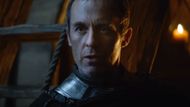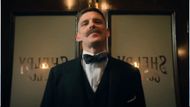Some characters' victories and vulnerabilities are nestled in our hearts, as these characters often become so real as if they’d stepped into our lives. But some characters paint their story with shades of disappointment, like a pattern of breaking trust. Whether the roguish protagonist who betrays confidence right when everything’s on the line or a naive idealist whose schemes never work out, these characters keep us hooked to the screen even when their next blunder feels inevitable. In the glamorous world of television, flaws take center stage through some characters ' driven actions, wild aspirations, or complete strokes of bad luck. Disappointment forms their lasting impact, which draws us back for the next round. Through evaluating their conduct and how they shape their respective narratives, in this article, we will explore 7 characters known for disappointing others.
Stannis Baratheon in Game of Thrones

Stannis Baratheon remained the disappointing king throughout the expansive tale of the TV show Game of Thrones. However, he was a person bound by duty and a force of uncompromising aspiration. By law, Stannis Baratheon was the legitimate successor of the Iron Throne. By estranging companions like Davos Seaworth, he drew himself into morally questionable territory as he relied on the sorceress Melisandre. Possible allies made him an outcast because of his apathetic appearance. He sealed his downfall and shocked viewers with ruthless treachery of his values when he sacrificed his daughter Shiren to appease the Lord of Light. It was a defining moment in his storyline. It was meant to solidify his win, but because of this heinous act, his army abandoned him, and ultimately it led to his inevitable loss. He failed to find an equilibrium of fairness with empathy, disappointing the audience and resembling characters. In the Game of Thrones universe, his stubborn loyalty to humanity made his narrative arc a tale of warning. Stannis failed to earn devotion or navigate the political terrain and secured his place in history as a disappointing king, despite having legal claim and combat expertise.
Louis Litt in Suits

Louis Litt was a disappointing yet endearing lawyer in the famous legal drama Suits. At Pearson Specter Litt, Louis, although a key individual, longs to be valued and included, but his actions frequently hinder his objectives. He was a complex character with a lack of confidence and made errors, constantly disappointing people around him. His intense longing to be seen or valued arose from frustration. He made many impulsive decisions, including sabotaging co-workers or disclosing confidential data, amid his rivalry with Harvey Specter and aching for Mike Ross’s recognition. People around him generated frustration because of his betrayal, which broke down trust. For example, his inability to provide competent client service or his attempt to step in were revealing his shortcomings. It could have been a good characteristic if he had shown loyalty to the firm, but he mostly had self-interest in mind, which eventually disappointed those people who put their faith in him. His tendency to harbor resentment and emotional ups and downs drives people away, despite having a strong grasp of legal principles. Louis’s arc in Suits was an emotional ride toward forgiveness and undoing progress.
Arthur Shelby in Peaky Blinders

In Peaky Blinders, Arthur Shelby is a disappointing antihero. He showed all the traits of a tragic character of a man who failed to meet others' expectations time and again. An intriguing but maddening character in the Birmingham shadow world, Arthur was an explosive combination of fidelity, wrath, and fragility, as he was the eldest of the Shelby brothers. He was often rebuked harshly and ruined the illicit empire, as he was struggling with psychological issues and mental scars from the 1st World War. His disappointments arose from unresolved inner struggles. Thomas, who used to lean on methodical exactness, was frustrated with Arthur’s rash decisions, such as halting transactions or becoming enslaved by addiction. He was overwhelmed by personal demons, which built a legacy of unfulfilled vows, despite his unwavering devotion and glimpses of softness. It was disappointing to his family and himself, as whenever he tried to make amends via marital ties or spiritual devotion, it collapsed beneath self-sabotaging behavior. Arthur Shelby’s trajectory revealed the toll of inner pain left unaddressed. Audiences were drawn to his gritty reality despite that his endless mistakes made him a doomed soul in the show.
Rebecca Mikaelson in The Vampire Diaries

An emotionally intricate character, Rebecca Mikaelson, whose actions consistently resulted in disappointment to the people around her in the TV show The Vampire Diaries. Her spur-of-the-moment action and unyielding devotion to kin built a track record of unreliability. Her eternal existence used to clash with her desire for a regular, human life. Due to her unpredictable outbursts and the Mikaelson Family’s disruptive presence, her romantic endeavors, like her relationship with Stefan Salvatore, end in sadness. She used to hold greater importance that left others feeling used. She disregarded friends like Elena Gilbert in order to prove her loyalty to her family, particularly to her brother Klaus. Her quest for absolution, such as attending high school in Mystic Falls, was perpetually eclipsed by habitual reliance on violence or manipulation. For example, her engagement in the sire bond drama with Tyler Lockwood caused a divide and pushed away her friends who wanted her betterment. Her disappointment arose from her inner turmoil, a human’s heart fighting against a vampire’s coldness. Rebecca in The Vampire Diaries remained a character of misfortune, who was forever chasing connection but was leaving disappointment in her wake.
Rollo in Vikings

As the brother of Ragner Loathbrok, Rollo was an intriguing character in the pulse-pounding show Vikings. His voyage was influenced by the relentless tug-of-war between allegiance and aspiration. His decisions frequently resulted in frustration, but his character was driven by a combat mindset and physical strength. Both his lineage and viewers were shocked when he chose to betray his brother Ragnar on a quest for power, especially when he formed a partnership with Franks. It was one of the defining moments that accentuated Rollo’s inner battle between his kin and his personal advantage. He exposed the unforgiving nature of Viking existence through his choices, and he bolstered the narrative depth even though primarily driven by self-motives. His inclination to disappointment didn’t arise from animosity but stemmed from his personal failings. The show kept the audience interested in Roll's story by skillfully using his arc to explore themes of devotion, restoration, and the costs of ambition. His unstable tendencies propelled the story, making certain that his influence echoed throughout the story.
Jamie Dutton in Yellowstone

Jamie Dutton was a lightning rod for turmoil and heartbreak in the riveting Yellowstone. As he was the adopted son of the powerful Dutton Family, his complex character was full of insecurities, which eventually disappointed the people around him. To safeguard their Montana ranch, being the Dutton family’s legal advice, they put him in the center of the struggle. Despite that, he consistently paved the way for dire consequences because of his unrelenting pursuit of approval. His decisions echoed with lasting repercussions as he prioritized his political ambitions over his family’s loyalty. To fulfill his ambitions, he betrayed his father, John Dutton, by leaking confidential data to a reporter. He was the family’s flawed component, as his sister Beth’s unwavering derision brought his flaws into sharp relief. What held the audience’s attention was his failure to elevate himself above his vulnerabilities. When he tried to grab the opportunities for salvation, whether by protecting the ranch legally, his lack of confidence and thirst for dominance derailed his objectives. The show proficiently leveraged Jamie’s character arc by uncovering his fidelity and inner truth to captivate the audience with the question of if he can free himself from the cycle of self-sabotage.
Kendall Roy in Succession

A character who was identified by his innate skill in letting people down, Kendall Roy was a pivotal figure in Succession. He demonstrated a pattern of inadequacy that blurred the boundaries between his personal struggles and professional performance. Being an heir to the Roy family’s media empire, Waystar RoyCo, Kendall was encumbered by the demand to live up to a legacy but repeatedly failed to measure up. He took a lot of impulsive decisions to fulfill his ambition to assume command of the company, be it his battle with addiction, unflinching self-confidence, or his inclination to break down under strain. In every season of the series, he attempted to validate his position as leader through betrayals, impulsive decisions, and instances of fragility that broke down the trust of the people around him, from his paternal relationships to his familial and professional connections. Kendall Roy distinguished himself as a character who persistently demonstrated that even those with great potential might fail when it matters the most, establishing his character as a source of emotional distress who had the courage to trust him.
